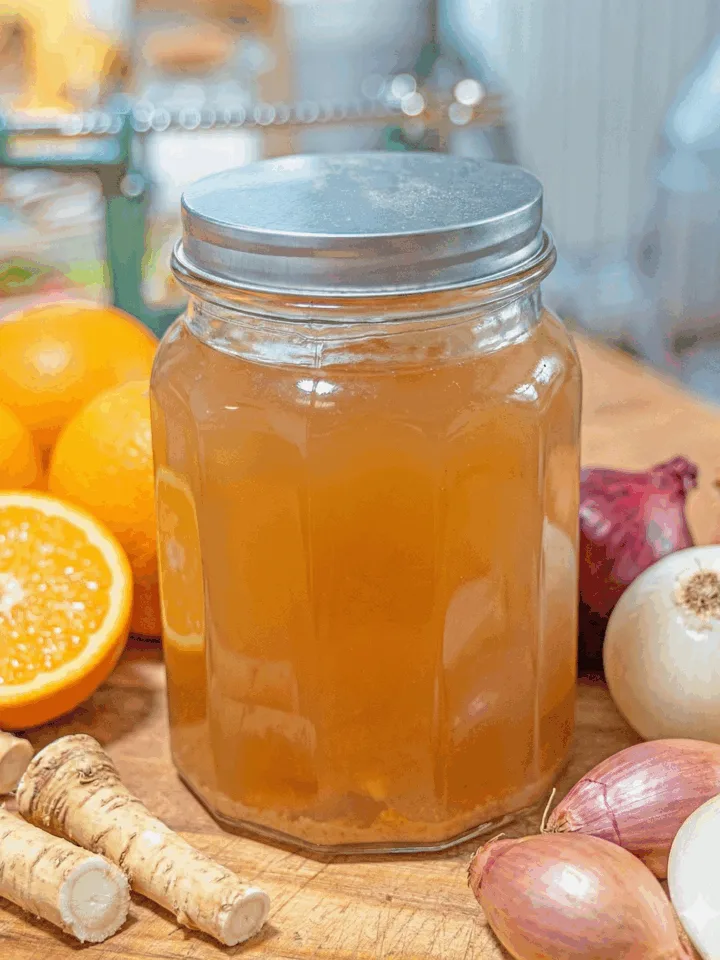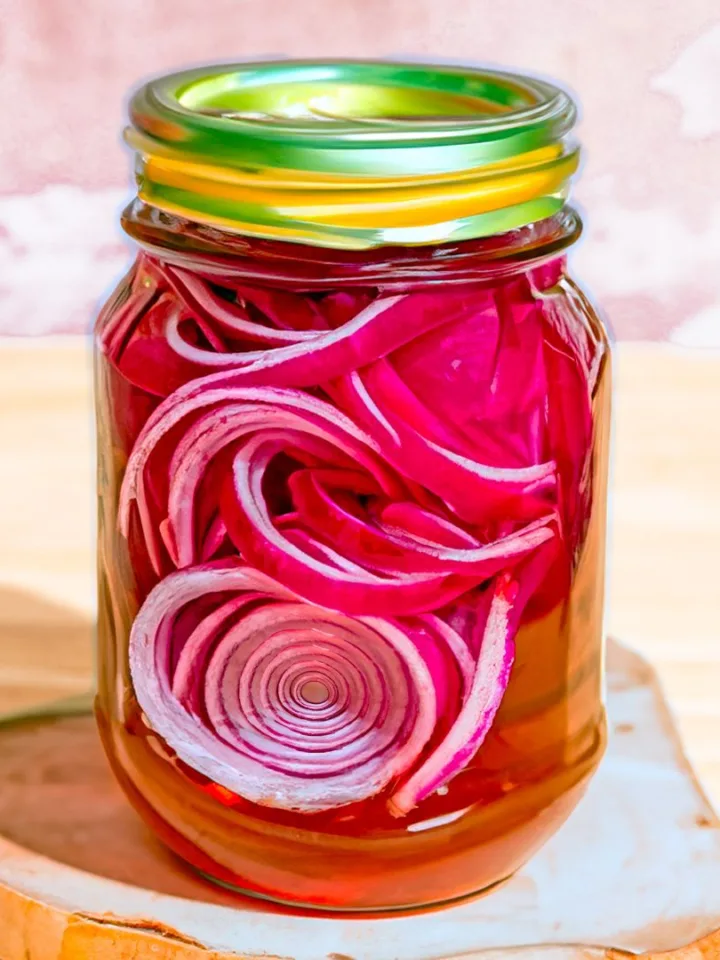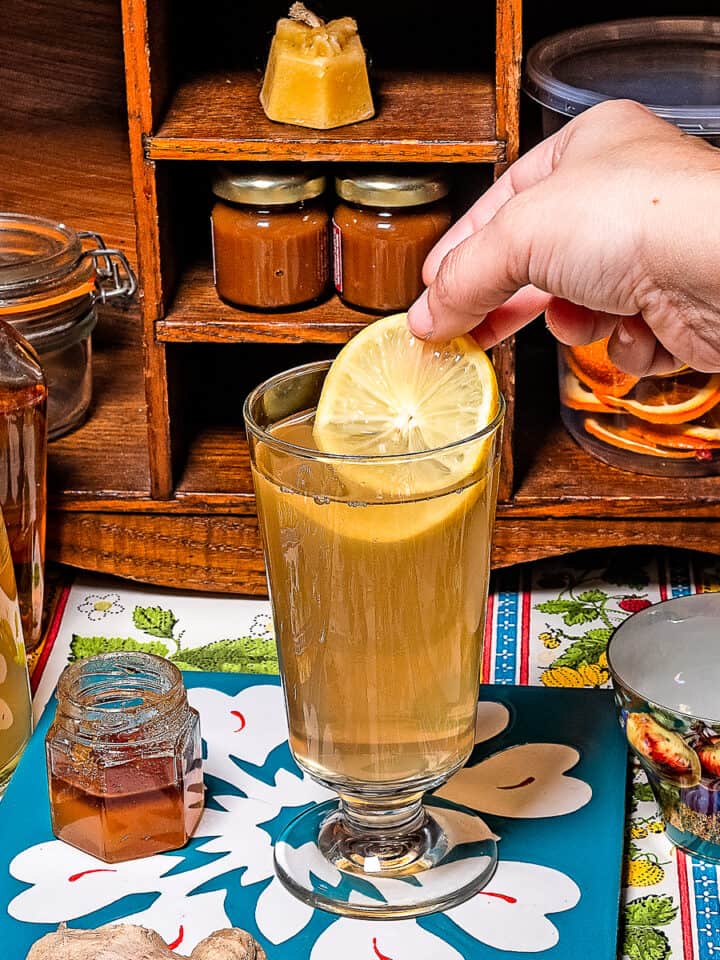Clove tea is a wonderfully refreshing and beneficial beverage with various health benefits. Learn how to prepare this warm delight at home and making it a part of your regular diet.

Quick Look: Clove Tea
- Type: Herbal tea (naturally caffeine-free)
- Made from: Whole dried cloves steeped in boiling water
- Brew time: 10–15 minutesFlavor: Bold, warming, and aromatic with a spicy kick
- Why drink it: A stronger brew for cold days, sore throats, and digestive discomfort*
Why Choose Clove Tea?
Clove tea derives its benefits from the spicy, aromatic clove buds. The well-documented advantages of this flavorful tea include:
- Rich in antioxidants: Like clove water, the tea is packed with antioxidants that fight inflammation and help improve your overall immune health.
- Boosts digestion: If you're dealing with digestive issues such as gas, bloating, or constipation, clove tea can help.
- Maintains cardiovascular health: Consuming clove tea can regulate cholesterol levels and blood sugar, promoting heart health.
- Natural analgesic: Clove is well-known for its pain-relieving properties, especially for dental issues. Sipping on clove tea can help alleviate toothache and sore gums.
Gathering Your Ingredients
For clove tea, the list of ingredients is minimal. You'll need whole cloves, hot water, and optionally a sweetener and lemon or lime juice if desired.
As mentioned before, whole cloves are much more flavorful, with their essential oils being in greater concentration than their ground counterparts. Natural sweeteners such as honey or maple syrup are recommended for sweeteners.
A Step-by-Step Guide to Brewing Clove Tea
- Boil a cup of water in a kettle or on the stove.
- Place 1 to 2 whole cloves in a teacup.
- Pour the boiling water over the cloves.
- Allow the cloves to steep in the water for 10-15 minutes.
- Strain if necessary and add your preferred sweetener.
Your perfect cup of clove tea is ready to drink!
Clove Tea Enhancements
There are plenty of ways to vary and enhance the flavor of your clove tea and make it even more enjoyable:
- Use additional spices: Add cinnamon or star anise for an extra spicy kick and an added depth of flavor.
- Experiment with sweeteners: Sweeteners like honey or maple syrup add sweetness and a unique flavor that complements clove well.
- Try citrus: A dash of fresh lime or lemon juice can add brightness to your drink and balance out the spiciness of the cloves.
Remember, the goal is to create a drink that you look forward to having, so don't hesitate to experiment with different flavors and components.
Storing and Serving Clove Tea
Clove tea is best enjoyed fresh. However, if you want to make it in larger quantities, you can store it in the refrigerator for up to 2 days.
When serving, consider garnishing with a slice of lemon or a cinnamon stick for added flavor and aesthetics. Use mugs or cups that retain heat well to keep your tea warm longer.
In conclusion, clove tea is a flavorful and beneficial addition to any diet. Brimming with health benefits and boasting a unique flavor profile, this pleasant drink may just become your new favorite. With these easy-to-follow instructions and tips, get ready to brew the perfect cup of clove tea. Enjoy the soothing and warm sensation of this delightful tea and witness the health benefits it brings to your life.
Comprehensive Guide: Health Benefits and Uses of Cloves
Cloves - these small flower buds from the clove tree, an evergreen tree, pack a powerful punch in terms of health benefits and culinary uses. They contain various vital vitamins and minerals such as Vitamin K, Vitamin E, and manganese, and are rich in anti-bacterial and anti-inflammatory properties, making them a wonderful addition to any diet or medical regimen.
Health Benefits of Cloves
- Rich in vitamins and minerals: One gram of ground cloves contains a small amount of the daily recommended intake of Vitamin E and Vitamin K, and it is particularly high in manganese, a mineral necessary for strong bones and the metabolism of proteins, carbs, and cholesterol.
- Contains eugenol: Cloves are rich in eugenol, a compound that has been shown to act as a natural anti-inflammatory substance. This can help reduce symptoms of arthritis and other inflammatory disorders.
- Good for oral health: The eugenol compound also has natural anesthetic properties that can help alleviate tooth pain. Clove water, or even clove oil when used responsibly, serves as a fantastic mouthwash because of its antibacterial properties, potentially reducing gum disease and other oral health complications.
- Boosts liver health: Clove extract and eugenol can help improve liver health. They can aid in protecting against liver damage and oxidative stress, which results from an imbalance of harmful compounds and detoxifying enzymes in your liver.
- May help regulate blood sugar levels: Eugenol can mimic the action of insulin and potentially lower blood sugar level, making cloves possibly beneficial for managing blood glucose.
- May aid in bone health: The manganese in cloves may help in increasing bone mass and improving overall bone health.
Culinary Uses of Cloves
Cloves can be used in their whole form, ground to a powder for dishes, or even extracted into clove oil for various uses.
- Spicing up dishes: With their warm and slightly sweet flavor, cloves are the perfect spice to add to meats, curries, marinades, and even hot beverages.
- Incorporating in desserts: Ground cloves can be found in many different types of desserts such as gingerbread cookies, apple pie, and pumpkin spice creations.
- Tea infusion: Cloves are a common ingredient in different types of tea blends and can even be made into a simple clove tea for a delicious, healthy drink.
Side Effects and Interactions
While cloves are generally safe when used appropriately, overuse may cause certain side effects such as indigestion, nausea, vomiting, or even seizures in extreme cases. Allergic reactions may also occur for some people.
Notably, eugenol, despite its health benefits, can cause blood to thin. This is important to consider before surgery or if taking medication to prevent blood clots, as it could lead to interactions.
Ideally, anyone with underlying health disorders or who is pregnant or breastfeeding should consult with a healthcare professional before adding high amounts of cloves or clove oil to their diet or health regimen.
Research and Studies
Multiple test-tube studies have indicated potential health benefits of cloves and clove oil. For example, they have been found to have anti-cancer properties by promoting the death of cancer cells. However, more studies are needed in human subjects to confirm these effects.
In summary, cloves are incredibly healthy and versatile. Whether you are looking to enhance the flavor of a dish or seek natural remedies for various health problems, cloves offer an impressively wide range of benefits.
- Nutritional Content and Health Benefits of Cloves: "Manganese" (2016). Linus Pauling Institute. Link
- Rich in Eugenol: "Cloves" (2019). PubChem, National Center for Biotechnology Information. Link
- Oral Health Benefits: "Effect of eugenol on cell surface hydrophobicity, adhesion, and biofilm of Candida tropicalis and Candida dubliniensis" (2015). Journal of Dental Research, Dental Clinics, Dental Prospects. Link
- Liver Health and Oxidative Stress: "Effects of clove and fermented ginger on liver and adipocyte proteins in high fat diet fed mice" (2017). Journal of Food Science and Technology. Link
- Blood Sugar Regulation: "Cloves improve glucose, cholesterol and triglycerides of people with type 2 diabetes mellitus" (2006). Food and Chemical Toxicology. Link
- Bone Health: "Effects of clove and fermented ginger on liver and adipocyte proteins in high fat diet fed mice" (2017). Journal of Food Science and Technology. Link
- Side Effects and Interactions: "Clove side effects" (2009). WebMD. Link
- Cancer-related Research: "Eugenol triggers apoptosis in breast cancer cells through E2F1/survivin down-regulation" (2012). BMC Cancer. Link
Please note that while scientific research supports these claims, always consult with a healthcare provider to interpret these findings and recommend personal health decisions.
As for the culinary uses of cloves – the source is based on common knowledge and traditional uses of cloves in food preparation.

Clove Tea
Clove tea derives its benefits from the spicy, aromatic clove buds.
Ingredients
- 1 cup water
- 2 whole cloves
Instructions
- Boil a cup of water in a kettle or on the stove.
- Place 1 to 2 whole cloves in a teacup.
- Pour the boiling water over the cloves.
- Allow the cloves to steep in the water for 10-15 minutes.
- Strain if necessary and add your preferred sweetener.
- Your perfect cup of clove tea is ready to drink!
Nutrition Information:
Yield:
1Serving Size:
1Amount Per Serving: Calories: 1Total Fat: 0gSaturated Fat: 0gTrans Fat: 0gUnsaturated Fat: 0gCholesterol: 0mgSodium: 10mgCarbohydrates: 0gFiber: 0gSugar: 0gProtein: 0g






Comments
No Comments